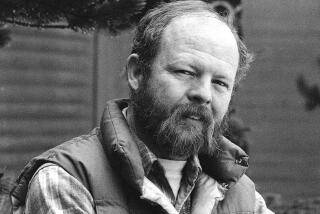Moving From Russia to the World
- Share via
Mikhail Gorbachev and James Bond, united to save the environment. Hard to believe, but there was Gorby, the once all-powerful leader of the Soviet empire, beaming happily at a star-studded bash in Beverly Hills. Gorbachev is now the president of the environmental group Green Cross International, and its local affiliate was giving actor Pierce Brosnan, who has played Bond, an award for his work on behalf of the planet.
“I love being on the same side as James Bond,” Gorbachev said. “He always wins.” It was a bittersweet comment from a man honored throughout the world for ending the Cold War but ignored, at best, in his own country.
Interviewing him later in a small hotel room in Beverly Hills, he seemed the same as when I last observed him 10 years ago holding sway at a conference on nuclear disarmament in the Kremlin--didactic, long-winded, but ever thoughtful.
Back then, his forceful words carried the import of a history that was his to control: the ending of the Cold War. Then, he was the leader of vast armies, and we hung on every word. But now he is a man without a country to lead, left to remind us of the unfinished business of peace--to make the world whole.
Crisscrossing the globe, he speaks of dolphins and resource-efficient affordable housing and the fragility of our supply of fresh water. In Los Angeles, he hunkered down with officials of the Department of Water and Power and other experts on the preservation of scarce water resources. He takes seriously his role as an ombudsman, invited by leaders in the Middle East and South America to help resolve the water conflicts in the Jordan River and the Pilcomayo River basins.
But the more provocative message of Gorbachev and his organization, which is called Global Green in this country, is that rapid economic growth in the developing as well as industrial world, if not checked in a socially responsible way, will prove disastrous.
His is one of the rare voices challenging the equation of individual freedom with an unfettered market economy. “If we insist on consumerism as the new Utopia,” he has said, “nature will reject such a system as surely as cultural diversity rejected the totalitarian system.”
Gorbachev is the ghost of our pretensions to be adult stewards of the world. He believed us when we talked of a postwar era in which military preoccupations would give way to solving the enduring problems of global waste, human rights and poverty. Instead, we, along with our new partners in Russia and China, are major purveyors of the arms trade, rapidly equipping others to fight. At the same time, our old enemies are now seeking to emulate our vastly disproportionate consumption of the earth’s nonrenewable resources.
When still in power, Gorbachev attempted through perestroika to move Russia down the path of Western European style social democracy. He was criticized during the Reagan years for not more fully embracing the dictates of the market economy and was denied most-favored-nation trade status.
By contrast, the inherently undemocratic Chinese model, which offers none of the religious and political freedoms that Gorbachev opened up in the old Soviet Union, has been hailed as an enormous success. Gorbachev presided over the dissolution of the Soviet empire while China has gobbled up Hong Kong, demands the return of Taiwan and is more repressive than ever in Tibet. But China has those free trade zones, a work force kept docile, weak environmental protections and other concessions to business that would warm the heart of the toughest corporate executive.
Now, the powerful U.S. corporate-financed China lobby is pushing the president to authorize the transfer of U.S. nuclear technology to China despite the judgment of the CIA that Beijing is the key supplier of missiles and nuclear materials to rogue states. Westinghouse and General Electric see big profits building nuclear power plants in China, but Gorbachev is less sanguine about the future of nuclear power, having memories of presiding over the dark uncertainties of the Chernobyl disaster.
At a time when Nobel laureate Henry Kissinger hustles deals for communist China and any other country with big bucks, it is refreshing to find Nobel laureate Gorbachev looking out for the interests of the rest of us.
There is an ebullience to the man that marks him more indelibly than the famous birthmark on his forehead, and one wishes him well. But as actor Brosnan pointed out in his acceptance speech at the awards dinner, in the real life battles to save the environment, as opposed to those fought by James Bond, the good guys often lose.
More to Read
Get the L.A. Times Politics newsletter
Deeply reported insights into legislation, politics and policy from Sacramento, Washington and beyond. In your inbox twice per week.
You may occasionally receive promotional content from the Los Angeles Times.










